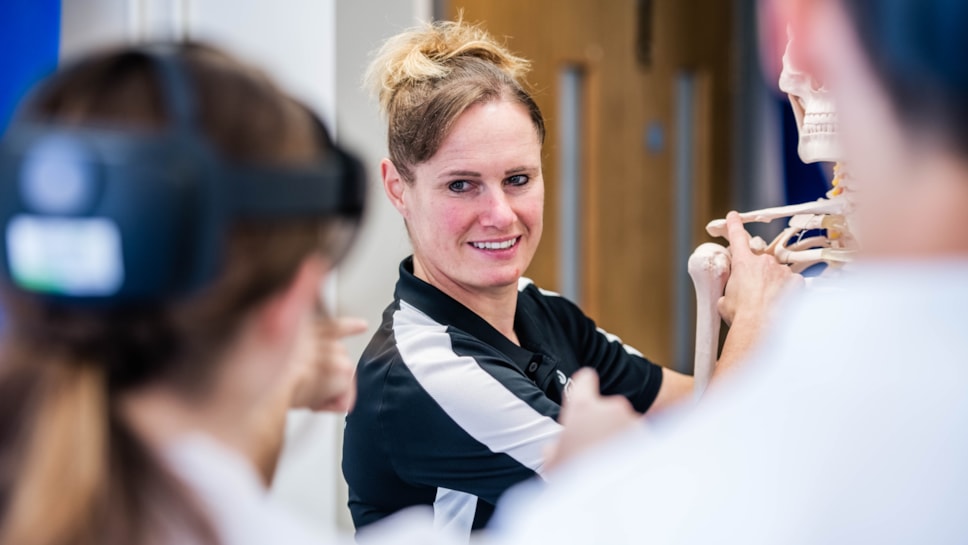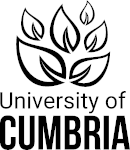
The Digitally Professional Physiotherapist
This blog outlines how physiotherapy academics in the University of Cumbria’s Institute of Health (IoH) are working with our Centre for Digital Transformation to digitally upskill.
This upskilling is in response to a recent update to the regulatory requirements for the profession and to ensure that curriculum design, content, and delivery affords physiotherapy students with opportunities to develop their digital capabilities, as part of their journey to become contemporary health professionals.
This work, building on and out from the Digitally Professional Paramedic conceptualisation is underpinned by changes in Health and Care Professions Council (HCPC, 2022) Standards of Proficiency, that stipulate how the professions they regulate "need to be able to keep up to date with digital skills and new technologies.”
It is an intention and aspiration of the university’s T2030 Strategy that programmes across the university are equipping students with digital knowledge, values, and skills relevant to their subject and that as graduates of the University of Cumbria they are entering the workplace digitally prepared. Specific to physiotherapy education, as outlined by Tome and Coelho (2023: 27), ‘physiotherapy education should prepare students for innovative demands and give physiotherapists the necessary instruments for novel insights into the workplace’.
The aforementioned changes to the Standards of Proficiency also articulate how, ‘technology continues to play an expanding role in the work of our registrants’ and that the regulator therefore require registrants to ‘maintain their ability to use new technology relevant to their practice’.
Specific standards
Registrants must:
- 5: recognise that the concepts of confidentiality and informed consent extend to all mediums, including illustrative clinical records, such as photography, video and audio recordings and digital platforms
- 7: use information, communication and digital technologies appropriate to their practice
- 3: use digital record-keeping tools where required
- 1: be able to change their practice as needed to take account of new developments, technologies and changing contexts.
Expectations of registrants:
- The use of technology has always been an important part of the way registrants meet the standards
- The four standards above cover key areas in which registrants should be able to make use of technology
- This standard does not mean registrants must be able to use all technology relevant to their field, as we know that registrants will have different access to technology based on their work setting and/or employer
- One way that registrants can integrate the new standards into their practice is through their own records. For instance, when offering telehealth services to a new service user, registrants should:
- consider how this might impact on the service user’s confidentiality
- take time to explain to the service user how their information might be stored differently when compared to a face-to-face meeting
- Registrants may also find it useful to specifically direct their continued professional development (CPD) to new technology relevant to their field
As outlined in a recent Times Higher Education piece, the University of Cumbria is taking a whole organisation approach to staff digital upskilling, through use of the JISC digital capabilities role profiles for all members of the university community.
While physiotherapy academics at the University of Cumbria were required to engage in digital development as a response to the global pandemic, the new programme for digital upskilling UoConnectED Digital Educator, offers a more paced and detailed experience, designed with digital acceptability, digital adoption, and innovation in mind.
Above: UoConnectED badges
The university’s physiotherapy subject team are the first full team of academics across the university to complete all six aspects of the Digital Educator badging, and they are now engaged in a review of all programmes of learning, with the view to embed UoConnectED Digital Graduate badge into their offer.
In 2019, the Chartered Society of Physiotherapy (CSP) were involved in the publishing of the ‘Digital Framework for Allied Health Professionals’, in conjunction with NHS England. The aim of this framework was to support NHS managers to develop the digital literacies of the clinical workforce. A move that had clear implications for higher education, given its role in the professional socialisation of the next generation of physiotherapists. The digital badges have been instrumental in ensuring IoH physiotherapy academics extend their digital compliance and confidence for the rapidly changing health and clinical environment.
Principal Lecturer in physiotherapy education Sarah Smith at the University of Cumbria said:
"As well as physiotherapy academic staff becoming skilled in digital technology for enhancing teaching and learning, the university enables students to engage in these skills through active learning. Students are then able to take this knowledge into clinical practice and apply it as part of patient care and delivery, helping bridge the ‘digital gap’ between education and health and social care provision. Whilst we still have work to do, we are already seeing the advantages of using digital technology for education".
What we know is that physiotherapy education and academics will have been making shifts in the design, content, and delivery of their programmes of learning to meet the new regulatory requirements. This blog offers University of Cumbria’s approach in the hope that it will evoke further exchanges across the physiotherapy academic and practice populations.
Authors
Carolyn KentLecturer in Physiotherapy
University of Cumbria
Professor Amanda Taylor-Beswick
Director of Centre for Digital Transformation
Professor of Digital and Social Sciences.
University of Cumbria
References
Health & Care Professions Council. (2023). Standards of proficiency: Physiotherapy. https://www.hcpc-uk.org/globalassets/standards/standards-of-proficiency/reviewing/paramedics---new-standards.pdf
The Chartered Society of Physiotherapy Digitally enabled physio: CSP helps Create Landmark Guide, The Chartered Society of Physiotherapy. Available at: https://www.csp.org.uk/news/2019-04-10-digitally-enabled-physio-csp-helps-create-landmark-guide (Accessed: 18 June 2024).
Tomé, A. and Coelho, J.L., 2023. Physiotherapy Education in the Digital Era: A Roadmap of Educational Technologies for Allied Health Educators. In Handbook of Research on Instructional Technologies in Health Education and Allied Disciplines (pp. 26-54). IGI Global.



